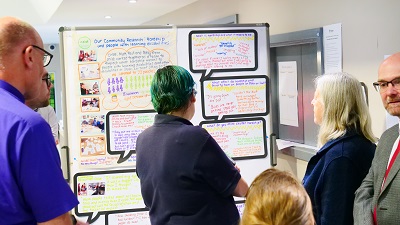University's pioneering work with community researchers will help inform new model of community research

The Get Talking Hardship project shed new light on the issues of poverty.
The Get Talking Hardship project was effective in recruiting and developing community researchers who helped us to get a unique insight into hardship and poverty in our area. We now want to build on this and work in collaboration with community members to create positive change for people experiencing poverty.”
New funding has been announced which will enable community researchers to continue their work to tackle the problems of poverty in Stoke-on-Trent.
Staffordshire University’s How to Keep Talking initiative is one of 53 successful UK projects, supported by UK Research and Innovation, which enables members of the public to actively contribute to research that affects their lives.
How to Keep Talking stems from the Get Talking Hardship project which recruited and developed 43 community researchers to take part in a Hardship Commission project which has helped shed new light on people’s experience of poverty in Stoke-on-Trent.
The new £38,000 grant will allow the University to understand how it can work in partnership with community organisations to build a sustainable model for community research moving forwards. This includes funding for a dedicated research and project assistant.
Staffordshire University Lead for Civic Engagement and Evaluation, Nic Gratton said: “The Get Talking Hardship project was effective in recruiting and developing community researchers who helped us to get a unique insight into hardship and poverty in our area.”
“This was an impactful project and the findings were covered in the local media and also raised by a local MP in the House of Commons. We now want to build on this and work in collaboration with community members to create positive change for people experiencing poverty.”
Tom Saunders, Head of Public Engagement, UK Research and Innovation, said: “This is one of 53 pilot projects that we have funded, all using exciting ways that researchers and innovators can involve the public in their work.
In 2020 and beyond, we will build on the lessons we learn through funding these pilot projects to help us achieve our ambition of making research and innovation responsive to the knowledge, priorities and values of society and open to participation by people from all backgrounds.”
The projects are the first to be funded as part of UKRI’s new vision for public engagement, launched in 2019. Each project will run for six months.